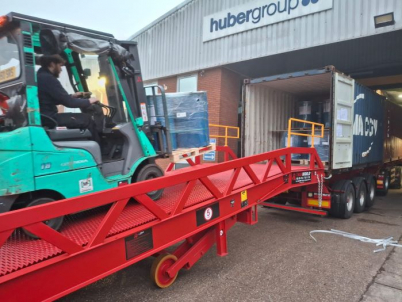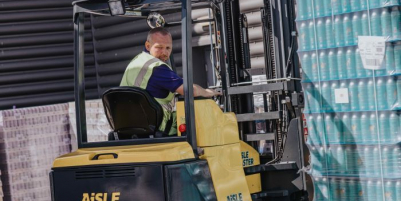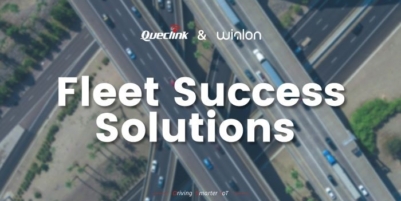-
Rite-Hite unveils new range of hydraulic kits to upgrade and extend dock leveller performance - February 19, 2026
-
REWE and Cimcorp automate fresh supply chain for Berlin supermarkets and stores - February 19, 2026
-
Q1 – A recovery period or time to fix, switch and scale? - February 19, 2026
-
NULOGY’S SHOP FLOOR SOFTWARE TO POWER COMPLETE CO-PACKING’SOPERATIONS - February 13, 2026
-
Why lead generation depends upon good content - February 13, 2026
-
Wallapop and Albatross Sign Strategic Partnership to Bring Real-Time AI Discovery to the Future of Consumer-to-Consumer Commerce - February 12, 2026
-
Thorworld ramp helps Hubergroup to streamline its unloading operation - February 6, 2026
-
TRACKER INNOVATION FROM QUECLINK TO BOOST STOLEN VEHICLE RECOVERY PERFORMANCE - February 4, 2026
-
Flexi Narrow Aisle hits 50! - January 29, 2026
-
DERRY BROS ATTRACTS RECORD NUMBERS OF FREIGHT CUSTOMERS SEEKING CUSTOMS SUPPORT - January 29, 2026
Only 1 in 4 fleet decision makers are extremely confident in their knowledge of fleet electrification
- More than a third of fleet decision makers still see cost as the main barrier to going electric, with one in five highlighting charging infrastructure as a concern
- Over half of fleet managers still haven’t made any changes to their driver policy for electric vehicles (EVs) and plug-in hybrid vehicles (PHEVs), despite many saying they plan to
- For company car fleets of 11-20 vehicles, this rises even higher to 65%
- Alphabet shares it’s EV Etiquette guide to help fleet managers and drivers navigate the new technology
New research from Alphabet(GB) has found that only a quarter of fleet managers are extremely confident in their knowledge of fleet electrification year on year, marking a 19% increase since 2020. A further 59% said their confidence in the subject is steadily building.
Despite this growing understanding, many fleet decision makers still have concerns about acquiring electrified vehicles for their business, with cost (32%), charging infrastructure (22%) and driver reluctance (27%) as the main barriers to switch to EVs and PHEVs.
This lack of confidence in fleet electrification knowledge is reflected in the fact that more than half of fleet decision makers (52%) have yet to make any updates to incorporate electrification into their company driver policies. For fleets of less than forty-seven vehicles, this rises to 63%. Even for bigger fleets of over two hundred vehicles, nearly 2 in 5 decision makers still need to make updates.
Electrified vehicle sales have however, continued to rise at rapid pace, with the pandemic acting as a catalyst for the sector. Alphabet has seen a 248% increase in pure electric vehicle orders year-to-date compared to 2020, and 174% rise in sales for plug-in hybrid vehicles in the same period.
The knowledge gap in the industry combined with an influx of new fleet EV and PHEV drivers means drivers may not be receiving the guidance they require. To help this transition into electric vehicle etiquette and support fleet managers that are still building their own fleet electrification knowledge, Alphabet has created the ‘EV Etiquette guide’ to help new drivers navigate the rules of electric.
EV Etiquette guide:
- Make it part of your routine – plan the charging of your vehicle as you would any other part of your journey, so you’re never caught short
- Don’t outstay your welcome – move your vehicle as soon as possible once charged to give others the opportunity to charge up. Setting an alarm can serve as a useful prompt
- Communicate your needs – if there are no charge points available, leave a note on a fellow driver’s windshield asking them to plug in your vehicle when they’ve finished. You can also leave a note to let others know when they can take over a charge point
- Too fast too furious – ensure you use a charger that accommodates your charging needs. Some vehicles can’t receive the higher levels of powers available from newer charge points, so always double check before plugging in
- Be considerate – properly replace the connector and wind the cord neatly, to remove trip hazards for other drivers and prevent damage being done to the charge point
- Keep cool when being ICEd – a charge point blocked by an Internal Combustion Engine vehicle, is known as being ICEd and prevents access to charging. Always be polite when asking them to move their vehicle
David Rose, Head of Product, Alphabet (GB) said: “It’s been great to see the demand for electrified vehicles increase at such a rapid pace this last year and demonstrates a change in mind set taking place in both the industry and with consumers.”
“This research however shows there’s still work to do in the industry to support fleet managers in moving their electrification strategies forwards and overcoming potential barriers, such as driver reluctance, which more than a quarter of decision makers highlighted as a concern. It is crucial that the correct guidance and advise is therefore provided for drivers, so they feel part of the journey throughout the transition. Helping drivers understand the basics of charging etiquette can be a great starting point for them to feel more comfortable about changing ICE habits and embracing electric, so more and more businesses can take advantage of the technology.”

































